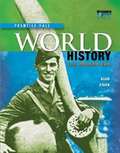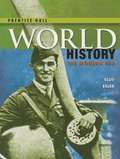 Prentice Hall World History: Connections to Today (Georgia Edition)
582696
Prentice Hall World History: Connections to Today (Georgia Edition)
582696
|
Elisabeth Gaynor Ellis
Anthony Esler
|
9780131285194 |
2005 |
|
|
 Prentice Hall World History: Connections to Today (Texas Edition)
536297
Prentice Hall World History: Connections to Today (Texas Edition)
536297
|
Elisabeth Gaynor Ellis
Anthony Esler
|
9780130627971 |
2003 |
|
|
 Prentice Hall World History: Connections to Today, Volume 1
326362
Prentice Hall World History: Connections to Today, Volume 1
326362
|
Elisabeth Gaynor Ellis
Anthony Esler
|
9780130510112 |
2001 |
|
|
 Prentice Hall World History: The Modern Era
374617
Prentice Hall World History: The Modern Era
374617
|
Elisabeth Gaynor Ellis
Anthony Esler
|
9780133723946 |
2011 |
NIMAC restricted
Contains images
|
|
 Prentice Hall World History: The Modern Era
380108
Prentice Hall World History: The Modern Era
380108
|
Elisabeth Gaynor Ellis
Anthony Esler
Kate Kinsella
Kevin Feldman
|
9780131299733 |
2007 |
|
|
 Prentice Hall World History: The Modern Era
500905
Prentice Hall World History: The Modern Era
500905
|
Elisabeth Gaynor Ellis
Anthony Esler
|
9780130510136 |
2001 |
|
|
 Prentice Hall World History: The Modern Era
1447553
Prentice Hall World History: The Modern Era
1447553
|
Elisabeth Gaynor Ellis
Anthony Esler
|
9780133231342 |
2014 |
NIMAC restricted
Contains images
|
|
 Prentice Hall World History: The Modern Era, Alabama
1182909
Prentice Hall World History: The Modern Era, Alabama
1182909
|
Elisabeth Gaynor Ellis
Anthony Esler
|
9780133274813 |
2015 |
NIMAC restricted
Contains images
|
|
 Prentice Hall World History: The Modern Era, New Mexico
2417174
Prentice Hall World History: The Modern Era, New Mexico
2417174
|
Elisabeth Gaynor Ellis
Anthony Esler
|
9780133724509 |
2012 |
NIMAC restricted
Contains images
|
|
 Prentice Hall World History: The Modern Era, Oklahoma
754722
Prentice Hall World History: The Modern Era, Oklahoma
754722
|
Elisabeth Gaynor Ellis
Anthony Esler
|
9780133244472 |
2014 |
NIMAC restricted
Contains images
|
|
 Prentice Hall World Studies: Eastern Hemisphere
1622476
Prentice Hall World Studies: Eastern Hemisphere
1622476
|
Prentice Hall Staff
|
9780132041508 |
2008 |
|
|
 Prentice Hall World Studies: Eastern Hemisphere
2039745
Prentice Hall World Studies: Eastern Hemisphere
2039745
|
Prentice Hall Staff
|
9780132041508 |
2008 |
Contains images
|
|
 Prentice Hall World Studies: Medieval Times to Today
393066
Prentice Hall World Studies: Medieval Times to Today
393066
|
Heidi Hayes Jacobs
Michal L. Levasseur
|
9780131816572 |
2005 |
|
|
 Prentice Hall World Studies: The Ancient World
309194
Prentice Hall World Studies: The Ancient World
309194
|
Heidi Hayes Jacobs
Kate Kinsella
Kevin Feldman
Michal L. Levasseur
|
9780131816503 |
2005 |
|
|
 Prentice Hall World Studies: Western Hemisphere
634927
Prentice Hall World Studies: Western Hemisphere
634927
|
Heidi Hayes Jacobs
Kate Kinsella
Kevin Feldman
Michal L. Levasseur
|
9780558228422 |
2009 |
|
|
 Prentice Hall Writing & Grammar Exercise Workbook 7th Grade
931952
Prentice Hall Writing & Grammar Exercise Workbook 7th Grade
931952
|
Pearson Education
|
9780133616910 |
2008 |
|
|
 Prentice Hall Writing And Grammar: Bronze Level (Handbook Edition)
198851
Prentice Hall Writing And Grammar: Bronze Level (Handbook Edition)
198851
|
Joyce Armstrong Carroll
Gary Forlini
Edward E. Wilson
|
9780130375476 |
2004 |
|
|
 Prentice Hall Writing Coach (6th Grade)
1088770
Prentice Hall Writing Coach (6th Grade)
1088770
|
Jim Cummins
Gary Forlini
Jeff Anderson
Kelly Gallagher
Evelyn Arroyo
|
9780132531405 |
2012 |
|
|
 Prentice Hall Writing Coach Grade 7
1411385
Prentice Hall Writing Coach Grade 7
1411385
|
Pearson Education
|
9780132531412 |
2012 |
|
|
 Prentice Hall Writing Coach: Writing and Grammar for the 21st Century (Grade #12)
2058061
Prentice Hall Writing Coach: Writing and Grammar for the 21st Century (Grade #12)
2058061
|
Jeff Anderson
Kelly Gallagher
|
9780132529921 |
2012 |
NIMAC restricted
Contains images
|
|
 Prentice Hall Writing Coach: Writing and Grammar for the 21st Century [Grade 10]
503161
Prentice Hall Writing Coach: Writing and Grammar for the 21st Century [Grade 10]
503161
|
Jeff Anderson
Kelly Gallagher
|
9780132529891 |
2012 |
NIMAC restricted
Contains images
|
|
 Prentice Hall Writing Coach: Writing and Grammar for the 21st Century [Grade 10]
2576204
Prentice Hall Writing Coach: Writing and Grammar for the 21st Century [Grade 10]
2576204
|
Jeff Anderson
Kelly Gallagher
|
9780132531443 |
2012 |
NIMAC restricted
Contains images
|
|
 Prentice Hall Writing Coach: Writing and Grammar for the 21st Century [Grade 11]
697765
Prentice Hall Writing Coach: Writing and Grammar for the 21st Century [Grade 11]
697765
|
Jeff Anderson
Kelly Gallagher
|
9780132531450 |
2012 |
NIMAC restricted
Contains images
|
|
 Prentice Hall Writing Coach: Writing and Grammar for the 21st Century [Grade 11]
1172626
Prentice Hall Writing Coach: Writing and Grammar for the 21st Century [Grade 11]
1172626
|
Jeff Anderson
Kelly Gallagher
|
9780132529914 |
2012 |
NIMAC restricted
Contains images
|
|
 Prentice Hall Writing Coach: Writing and Grammar for the 21st Century [Grade 12]
623248
Prentice Hall Writing Coach: Writing and Grammar for the 21st Century [Grade 12]
623248
|
Jeff Anderson
Kelly Gallagher
|
9780132531467 |
2012 |
NIMAC restricted
Contains images
|
|